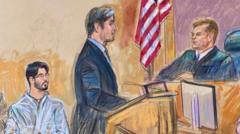In his first Mass as Pope Leo XIV, the American pontiff commits to uplifting the marginalized and emphasizing missionary work within the Catholic Church, while hinting at a fresh direction for the church's mission.**
### Pope Leo XIV's First Mass Highlights Emphasis on Missionary Outreach

### Pope Leo XIV's First Mass Highlights Emphasis on Missionary Outreach
**Inaugural Homily Calls for Focus on Ordinary People and Social Justice**
---
In a historic event on Friday, Pope Leo XIV, the first American pontiff, celebrated his inaugural Mass at the Sistine Chapel, addressing the urgent need for "missionary outreach" to assist in healing societal wounds. He placed himself firmly on the side of everyday individuals during his homily, directly challenging the elite and powerful.
The newly elected pope, born Robert Francis Prevost in Chicago, highlighted his commitment to "ordinary people" while acknowledging the detrimental impacts of a waning religious faith that has led to "appalling violations of human dignity" globally. Leo XIV expressed a clear intention to focus on the church’s direction amidst growing challenges.
His first act as pope captivated an audience of cardinals, echoing teachings from his predecessor, Pope Francis, while also establishing his unique voice within the Catholic hierarchy. He underscored the importance of building connections with the faithful who feel either marginalized or abandoned by the church, marking a significant moment in his papacy.
As he stepped onto the balcony of St. Peter’s Basilica to greet the public, he emphasized "building bridges" but withheld specific details about his governance. Critics and supporters alike are keenly observing how Leo XIV will choose to navigate the existing divides within the church.
Pope Leo XIV's background as a cardinal, where he spent two decades in service in Peru, plays a crucial role in his identity as a leader focused on outreach and inclusivity. His election comes at a pivotal time for the Catholic community, with demographic shifts enforcing a need for a more engaged and dynamic leadership.
During his homily, Leo XIV invoked the story of Jesus, who was embraced by the ordinary but ultimately abandoned. He warned that various contemporary societal settings present challenges for fostering a Christian presence where believers face persecution or ridicule. Yet, he firmly called for a revival of missionary efforts in these "enemy territories," affirming his commitment to address the spiritual and humanitarian crises facing communities today.
As Leo XIV settles into his papacy, he faces a plethora of intricate issues, along with expectations from both progressive and conservative factions within the church. His initial remarks and commitments leave many hopeful for an administration that prioritizes care for the vulnerable while honoring traditional Catholic values.
With an eye toward future engagement, the new pontiff indicated that he would hold a significant meeting with journalists soon, offering a glimpse into his planned initiatives as the anticipated leader of over 1.4 billion faithful around the globe.
In a historic event on Friday, Pope Leo XIV, the first American pontiff, celebrated his inaugural Mass at the Sistine Chapel, addressing the urgent need for "missionary outreach" to assist in healing societal wounds. He placed himself firmly on the side of everyday individuals during his homily, directly challenging the elite and powerful.
The newly elected pope, born Robert Francis Prevost in Chicago, highlighted his commitment to "ordinary people" while acknowledging the detrimental impacts of a waning religious faith that has led to "appalling violations of human dignity" globally. Leo XIV expressed a clear intention to focus on the church’s direction amidst growing challenges.
His first act as pope captivated an audience of cardinals, echoing teachings from his predecessor, Pope Francis, while also establishing his unique voice within the Catholic hierarchy. He underscored the importance of building connections with the faithful who feel either marginalized or abandoned by the church, marking a significant moment in his papacy.
As he stepped onto the balcony of St. Peter’s Basilica to greet the public, he emphasized "building bridges" but withheld specific details about his governance. Critics and supporters alike are keenly observing how Leo XIV will choose to navigate the existing divides within the church.
Pope Leo XIV's background as a cardinal, where he spent two decades in service in Peru, plays a crucial role in his identity as a leader focused on outreach and inclusivity. His election comes at a pivotal time for the Catholic community, with demographic shifts enforcing a need for a more engaged and dynamic leadership.
During his homily, Leo XIV invoked the story of Jesus, who was embraced by the ordinary but ultimately abandoned. He warned that various contemporary societal settings present challenges for fostering a Christian presence where believers face persecution or ridicule. Yet, he firmly called for a revival of missionary efforts in these "enemy territories," affirming his commitment to address the spiritual and humanitarian crises facing communities today.
As Leo XIV settles into his papacy, he faces a plethora of intricate issues, along with expectations from both progressive and conservative factions within the church. His initial remarks and commitments leave many hopeful for an administration that prioritizes care for the vulnerable while honoring traditional Catholic values.
With an eye toward future engagement, the new pontiff indicated that he would hold a significant meeting with journalists soon, offering a glimpse into his planned initiatives as the anticipated leader of over 1.4 billion faithful around the globe.


















